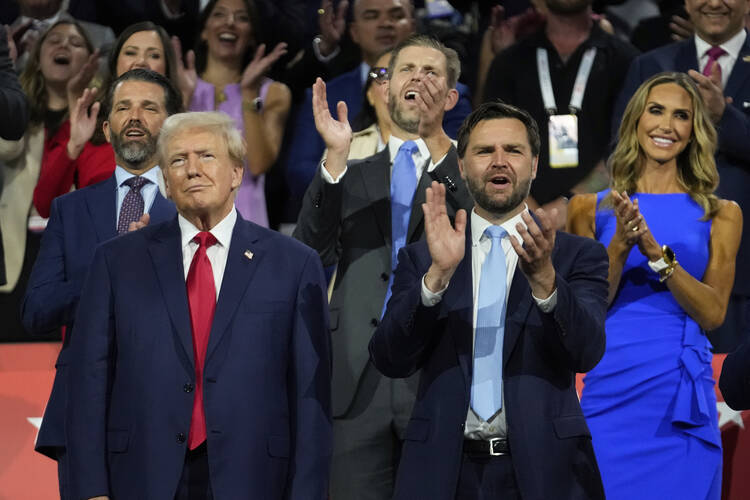Donald J. Trump’s selection of J.D. Vance as his running mate is a good reminder that U.S. Catholics are still politically homeless. To start with, the Trump-Vance ticket will be the most pro-choice G.O.P. ticket in some time. Mr. Trump has sought to neutralize the issue of abortion by backing away from federal legislation and forcing Republicans to drop the issue from their party platform. The contenders for the vice-presidential nomination slot seem to have paid attention to this. As Jonathan Liedl of the National Catholic Register noted on X, both Mr. Vance and Marco Rubio, the senator from Florida, apparently competed for Mr. Trump’s favor “by diluting their opposition to abortion.” In the case of Mr. Vance, that meant supporting in vitro fertilization and access to the abortion pill mifepristone.
At one time, the presence of Catholics on both major-party tickets (for only the second time in history) would have been cause for celebration among U.S. Catholics. But now Mr. Vance and President Joe Biden, the expected Democratic nominee for president, reflect the divisions within the faith community. Mr. Biden, an Irish-American cradle Catholic from the East Coast, represents a wing of the American church (many of whom entered the white middle class after World War II) that is comfortable with labor rights and social democracy, and that has trended increasingly liberal on social issues in line with the Democratic Party. Mr. Vance is a Catholic convert from the Midwest whose political profile mirrors many on the American right today: drifting away from the Republican Party’s economic libertarianism, perhaps toward a post-liberalism that counts many Catholic intellectuals among its ranks.
Faced with such a choice, many Catholics will become more entrenched, seeing their preferred Catholic candidate and his party as more in touch with Catholic social teaching. That is unfortunate, because it is as clear as ever that neither major political party adequately represents the Gospel, and thus neither deserves the uncritical allegiance of Catholics.
A kingdom not of this world
This election presents challenges but also opportunities. The challenges are well-known: Who can Catholics vote for? How should they choose? Who should they listen to when making their decisions?
But there are also opportunities. The more Catholics accept that they can neither embrace nor be held captive by either major political party, the more they can become more creative agents.
Imagine a world where Catholics, whether individuals or organized in groups, feel more empowered to find allies across the aisle; to build broad coalitions on diverse policy issues; to elevate important problems that now do not receive enough attention because they do not reflect partisan and ideological flashpoints; and to bring together voters, activists, experts and elected officials to address some of the most crucial issues facing our country.
Imagine Catholics reminding Americans what true civic friendship, substantive discourse and healthy politics look like, and all because our Gospel points to the love our God shares with the world and wants us to share with his children.
Imagine, moreover, the locus of this formation and advocacy being in parishes and lay moments, strengthening such communities and witnessing to the fundamentally spiritual nature of this labor.
In this world, by stepping bit by bit away from our partisan identities, we can strive to live out the challenge laid out in the U.S. Conference of Catholic Bishops’ “Forming Consciences for Faithful Citizenship” document: “It is our responsibility to learn more of Catholic teaching and tradition, to participate in Church life, to learn from trustworthy sources about the issues facing our communities, and to do our best to make wise judgments about candidates and government actions…. [T]his is not a time for retreat or discouragement; rather, it is a time for renewed engagement.”
This is a world in which Catholics stop taking their political identity for granted. It is also a world in which the political parties stop taking Catholics for granted.
Pope Francis has asked the church to be less defensive, less focused on its self-preservation and more intent on serving others. What if American Catholics applied that advice to their own political parties? If Catholics could challenge their own parties to be more faithful to the vision of justice and peace offered by the Gospel, that would be a great gift to America.
Mr. Vance himself could play a role in challenging how Catholics engage U.S. politics. He has already done it once with his 2016 book Hillbilly Elegy, which led him into conversation with a wide variety of intellectuals and media figures acoss partisan and ideological divides about some of the fundamental problems facing the United States. And his openness to bucking Republican Party economic dogma, suggested by his favorable comments about labor unions and his statements rejecting fiscal libertarianism, could signal opportunities to work across the aisle—at least if a second Trump administration takes advantage of his policy chops and allows him to pursue his pet policies.
Regardless of what happens in 2024, U.S. Catholics will continue to face the challenge of acknowledging how politically homeless they are even as they fight for peace and justice. Christ’s kingdom is not of this world, and so ultimately ours cannot be, either.
This is part of a series of columns by Bill McCormick, S.J., on the 2024 election. Also read:
- Did we just watch the last presidential debate?
- 2024 election advice: Pray for your political enemies.
- The defeats of DeSantis and Haley raise the question: Has Trump always been ‘inevitable’?
- Is politics bad? It depends on your view of human nature.
- How to prepare for next year’s elections? Here are 3 tips to keep you spiritually sane.








